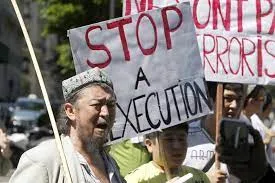According to Dr. Stanton, head of the global organization Genocide Watch, the Indian government has signed the organization's charter, so it cannot avoid action.
The Indian government is facing international embarrassment over the issue of Dharma Sansad declaring genocide of Muslims in India. At the same time, the pressure to act is growing. Meanwhile, Geno Sidewatch, an international organization that monitors genocide and related statements and actions, has also reminded the Indian government that it has signed the organisation's charter, so it is bound to Take immediate action against those who make statements regarding murder.
Dr Gregory Stanton, head of Genocide Watch and an expert on genocide studies, said the Indian government needed to take immediate action in the case of the Dharma Sansad in Haridwar or it would be violating several international charters. Will be stopped. Speaking at an international seminar on genocide, Dr. Stanton, who has authored several books on genocide prevention, said: Since then, political rhetoric has been going on in India. At the same time, what happened in the Hari Dwar Dharma Sansad is clear and concise. ”He added that the Indian government should take immediate action in this regard and that it should be ideal so that the future No one could think of a serious and heinous crime like genocide. According to Dr. Stanton, India has stopped genocide The charter has been signed and the country has been strongly opposed to any such move. That is why it is important for the Indian government to put an end to .
The key role of the Uyghurs and the Pakistani factor in the "Chinese dream"
Although the massacre in the Uyghur diaspora is a well-known phenomenon in the outside world, the external factors that are closely supporting and creating conditions for this kind of atrocity by the Chinese government have been ignored to varying degrees. One such country can be said to be the Islamic Republic of Pakistan, which has been in friendly diplomatic relations with China for decades. Issues about the indirect role played by Pakistan, the world's second-largest Islamic state in the Uyghur genocide, were high on the agenda at a March 3 seminar organized by the UK branch of Amnesty International.
Nabila Khan, head of Amnesty International's UK office, first briefed the audience on the issue of genocide and forced labor in the Uyghur diaspora. He also provided some details on the subject, quoting from the War Against the Uyghurs, by Sean Roberts, a professor at George Washington University. Subsequently, one of the main reasons why the Uyghurs are now facing so much repression by the Chinese government is the central part of the "One Belt One Road" project in the area where they live, which Xi Jinping is vigorously pursuing, as well as being considered the most powerful means of realizing the "Chinese dream." Emphasized that it was.
According to Nabila Khan, the Chinese government has begun construction of the "One Belt One Road" in the name of reviving the ancient Silk Road. Although the "One Belt", which stretches from Asia to Europe on the mainland and the "one way" from China's coastal coast to Europe via the Indian Ocean to the Eurasian continent, there is a lot of speculation about whether to start the project in the future. Focuses on creating a truly "safe zone" for energy security. Because China’s biggest and most deadly weakness right now is its energy needs, at least 60-80 percent of the energy it needs from China comes from the outside world, including the Middle East. The energy is mainly transported by sea and transported to coastal cities in China via the Arabian Sea, the Indian Ocean and the Straits of Malacca. The Chinese economy, the Chinese government, as well as the Chinese Communist Party will face a serious crisis if the "enemy forces" in China's eyes cut off this energy import by sea. That is why the Chinese Youth Daily declared in 2004 that "whoever controls the Strait of Malacca is essentially taking control of China's energy path." The Chinese economy, the Chinese government, as well as the Chinese Communist Party will face a serious crisis if the "enemy forces" in China's eyes cut off this energy import by sea. That is why the Chinese Youth Daily declared in 2004 that "whoever controls the Strait of Malacca is essentially taking control of China's energy path." The Chinese economy, the Chinese government, as well as the Chinese Communist Party will face a serious crisis if the "enemy forces" in China's eyes cut off this energy import by sea. That is why the Chinese Youth Daily declared in 2004 that "whoever controls the Strait of Malacca is essentially taking control of China's energy path."
According to Nabila Khan, the Chinese government is trying to smuggle oil resources imported from the Middle East to China via Pakistan before crossing the Indian Ocean to prevent this deadly weakness. Even if the Indian Ocean is controlled by "hostile forces", China's energy imports will not be affected. In addition, it is possible to safely transport imported energy to Chinese provinces via short distances without having to travel long distances. This saves a lot of time and money. It is for this purpose that the Chinese government is urgently implementing the $ 63 billion Sino-Pakistani economic project, with the port of Gwadar as the starting point and Kashgar as the end point. The Uyghurs in the region have become "the most dangerous people" in the eyes of the Chinese government for the completion of the project and its smooth future. The "absolute security" of the Kashgar-centric region, which has been an important crossroads since ancient times, has become more important than ever for the Chinese government. One important preventive measure is to prevent Uyghurs from being harassed in the future.
The fact that the Pakistani government is so important to the Chinese government in the current Uyghur massacre that it has created a "sweeter than honey" friendship between China and Pakistan was also a special topic of discussion at the meeting. While the Chinese government's demand is one side of the issue, Pakistan's poverty is another. At the time, the British Empire invested heavily in the construction of India's railways when India colonized India. But this was never for the betterment of the lives of the Indian people, but rather for the need to expedite the accumulation of wealth from India. The main theme of the "Sino-Pakistani Economic Project" currently being implemented by the Chinese government is the transport sector and electricity, which has no intention of "benefiting" the Pakistani people. Given China’s future oil imports, Pakistan has always played such an important role in China. As this link between them has made Pakistan the closest friend of China, China has “silenced” the Uyghurs to ensure the safety of this corridor passing through Pakistan, as well as Afghanistan, Tajikistan, Iran, etc., which has hidden its “unfavorable” factors around Pakistan. That is why the second phase of the China-Pakistan Economic Project is currently underway, with the construction of an international airport in the poor city of Gwadar. The Chinese government's high-tech surveillance mechanism is being deployed in Pakistan. This creates new conditions for human rights abuses.
Nabila Khan summed up the situation and stressed the importance of putting international pressure on Pakistan, which is closing the deadly weakness of the Chinese government. According to him, the money sent to the relatives of Pakistanis in exile, including more than one and a half million Pakistanis in the UK, currently accounts for ten per cent of the Pakistani economy.
At the end of the meeting, there were separate questions and answers on issues such as the British government's position on the Uyghur issue and the Muslim world's cooperation with China.




